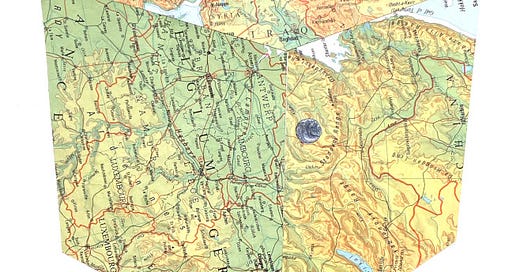Consider the dates of these people - they all could have met in a coffee shop to exchange ideas:
Ludwig van Beethoven baptized 17 December 1770 – 26 March 1827 Immanuel Kant 22 April 1724 – 12 February 1804 Johann Wolfgang von Goethe 28 August 1749 – 22 March 1832 Caspar David Friedrich 5 September 1774 – 7 May 1840 Joseph Mallord William Turner 23 April 1775 – 19 December 1851 William Blake 28 November 1757 – 12 August 1827
I’m not an historian, but it seems to me these six held some of the keys to Romanticism and there were many more like-minded artists and thinkers strewn across Western culture at the time. I don’t think that door has locked, even today it hasn’t drawn completely closed. There is a thread between then and now that runs through the so-called ‘avant garde’ with its awareness of where it was in history and the forms it used to make its work
Clement Greenberg said that Modernism began with Kant [quote below], probably because of the meta-consciousness involved in Kant’s philosophy: Kant initiated phenomenology, the seeing of seeing. I am extrapolating Greenberg's claim to all the Romantics. Romanticism is the beginning of Modernism.
To declare Romanticism as a part of Modernism is a funny overlap, isn’t it? I would even go so far as to say Postmodernism is also part of this same package, it’s a very Kantian way of making art. That process is a sly looking-back and analyzing.
Of course, that's easy for me to say because I don't believe in Postmodernism. I think it's just wishful thinking, blind to where it sleeps. Something “post” may have turned up already but it’s difficult to find in the chaotic sea of money that’s drowning contemporary art.
I think I’m an old school Romantic, born at the tail end of Modernism as it sours with the so-called post-modern. That alleged meta-knowledge really amounts to no more than a poor man’s version of Hesse’s glass bead game. Postmodernism plays with intellectual history to discover novel connections - nothing new, just endless re-considerations. I don’t think that measures up as art. And as Ad Reinhardt said, “Art is art, everything else is everything else.”*
Perhaps neoRomanticism is upon us. The sublime is peeking through the cracks.
I identify Modernism with the intensification, almost the exacerbation, of the self-critical tendency that began with the philosopher Kant. Because he was the first to criticize the means itself of criticism. I conceive of Kant as the first real Modernist. Clement Greenberg, “Modernist Painting” in New Art, G. Battcocok (ed.): N.Y., Dutton, 1966, p. 101.





